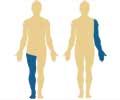Researchers will report that a variant in SERPINE1, a gene involved in inflammation and blood clotting, is associated with cerebral palsy and death in very preterm babies.

Previous genetic studies of very preterm babies have suggested several genetic variations that might predispose to brain injury and developmental problems. However, different studies have had different results.
This study, titled Genetic Predisposition to Adverse Neurodevelopmental Outcome After Early Preterm Birth: A Validation Analysis, was a collaborative effort between the Eunice Kennedy Shriver NICHD Maternal-Fetal Medicine Units and Neonatal Research Networks.
Researchers evaluated two different populations of very early preterm births (earlier than 32 weeks) with the goal of confirming the same genetic risk factors in both groups. The first population of preterm births was enrolled in a large Neonatal Research Network study, and the other group was of births that were enrolled in a Maternal Fetal Medicine Units Network study of magnesium sulfate before preterm birth for prevention of cerebral palsy.
Results revealed a variant in the gene SERPINE1, a gene involved in inflammation and blood clotting, was associated with cerebral palsy and death after early preterm birth in both populations of preterm babies.
"Preterm birth is the leading cause of childhood brain injury in otherwise normal children. The earlier a baby is born, the higher the risk of brain injury. However, even among the tiniest preemies, some babies develop quite normally, while others have devastating brain injury and life-long disability," said Erin Clark, M.D., the study's author. "The reason for this difference in outcomes is not well understood. Genetics may allow identification of babies at increased risk so that we can target those babies for prevention and treatment strategies. These results add to the evidence that genes may play a role in risk of brain injury and death in preterm babies."
Advertisement
Source-Eurekalert














